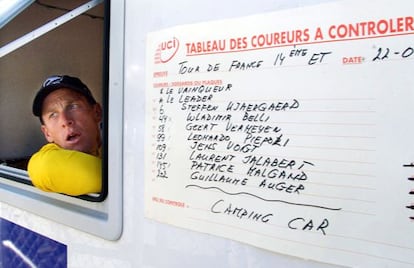Armstrong banned for life
Spanish cyclists reflect on “sad” case of cyclist who “never tested positive”

Lance Armstrong has "no place in cycling," Pat McQuaid said Monday after the American rider was stripped of his seven Tour de France titles and banned from the sport for life.
McQuaid, president of the International Cycling Union (UCI), the world governing body that ratified the US Anti-Doping Agency (USADA)'s charges against Armstrong, added that the Texan "deserves to be forgotten in cycling."
"The UCI wishes to begin the journey on that path forward today by confirming that it will not appeal to the Court of Arbitration for Sport and that it will recognize the sanction that USADA has imposed. I was sickened by what I read in the USADA report," said McQuaid. USADA's sanctions against Armstrong were the culmination of a years-long investigation — which the cyclist has labeled a witch-hunt — into the alleged doping practices employed by Armstrong and other members of the US Postal Service team. On October 10, USADA published a report accusing Armstrong of being embroiled in "the most sophisticated, professional and successful doping program that sport has ever seen."
Armstrong, who has always denied any wrongdoing, did not contest the charges on this occasion because, he said, "there comes a point in every man's life when he has to say 'enough is enough'."
What's happened to Armstrong is unfair. Somebody accuses you of doping and anything goes"
With scandal after scandal, the outcome of the USADA investigation has thrown the entire future of the sport into question. Last week, Rabobank, which had sponsored the eponymous team for 17 years, withdrew from professional cycling amid concerns the sport is incapable of cleaning itself up. In the wake of Armstrong's life ban, demands for McQuaid and the entire UCI board to resign gathered pace.
"Cycling has a future. This is not the first time cycling has reached a crossroads or that it has had to begin anew," McQuaid told a press conference. "When I took over in 2005 I made the fight against doping my priority. I acknowledged cycling had a culture of doping. Cycling has come a long way. I have no intention of resigning."
Oscar Pereiro, who was handed the 2006 Tour de France title after Floyd Landis was disqualified for doping, said the decision to ban Armstrong was "understandable, but also sad."
"The sport that gave so much to me is making me very sad," Pereiro said. "I hope a line can be drawn under it now and cycling can move on, but with the resignation of the entire UCI."
Pereiro suggested that the evidence against Armstrong was less than convincing. "After so many years and with more than 10 million euros spent they sanction him on the strength of testimony from his teammates and not by evidence of their own."
Samuel Sánchez, the 2008 Olympic road race gold medalist, said the UCI's decision to ban Armstrong was incorrect. "What's happened to Armstrong is unfair, he has never tested positive. Somebody accuses you of doping and anything goes."
The UCI said it had tested Armstrong on 218 occasions and that he had "beaten the system." The governing body said the World Anti-Doping Agency should also assume responsibility for the scourge of doping. The UCI will decide on Friday what to do with the titles that have been stripped from Armstrong. Tour de France director Christian Prudhomme said the history book should remain blank: "This period must be marked by a lack of victors. This is a crisis for cycling that affects not just France, but the whole world." The UCI has the final decision in the matter.
Asked if he thought the sport would ever be completely clean, McQuaid answered: "No."
Tu suscripción se está usando en otro dispositivo
¿Quieres añadir otro usuario a tu suscripción?
Si continúas leyendo en este dispositivo, no se podrá leer en el otro.
FlechaTu suscripción se está usando en otro dispositivo y solo puedes acceder a EL PAÍS desde un dispositivo a la vez.
Si quieres compartir tu cuenta, cambia tu suscripción a la modalidad Premium, así podrás añadir otro usuario. Cada uno accederá con su propia cuenta de email, lo que os permitirá personalizar vuestra experiencia en EL PAÍS.
¿Tienes una suscripción de empresa? Accede aquí para contratar más cuentas.
En el caso de no saber quién está usando tu cuenta, te recomendamos cambiar tu contraseña aquí.
Si decides continuar compartiendo tu cuenta, este mensaje se mostrará en tu dispositivo y en el de la otra persona que está usando tu cuenta de forma indefinida, afectando a tu experiencia de lectura. Puedes consultar aquí los términos y condiciones de la suscripción digital.








































